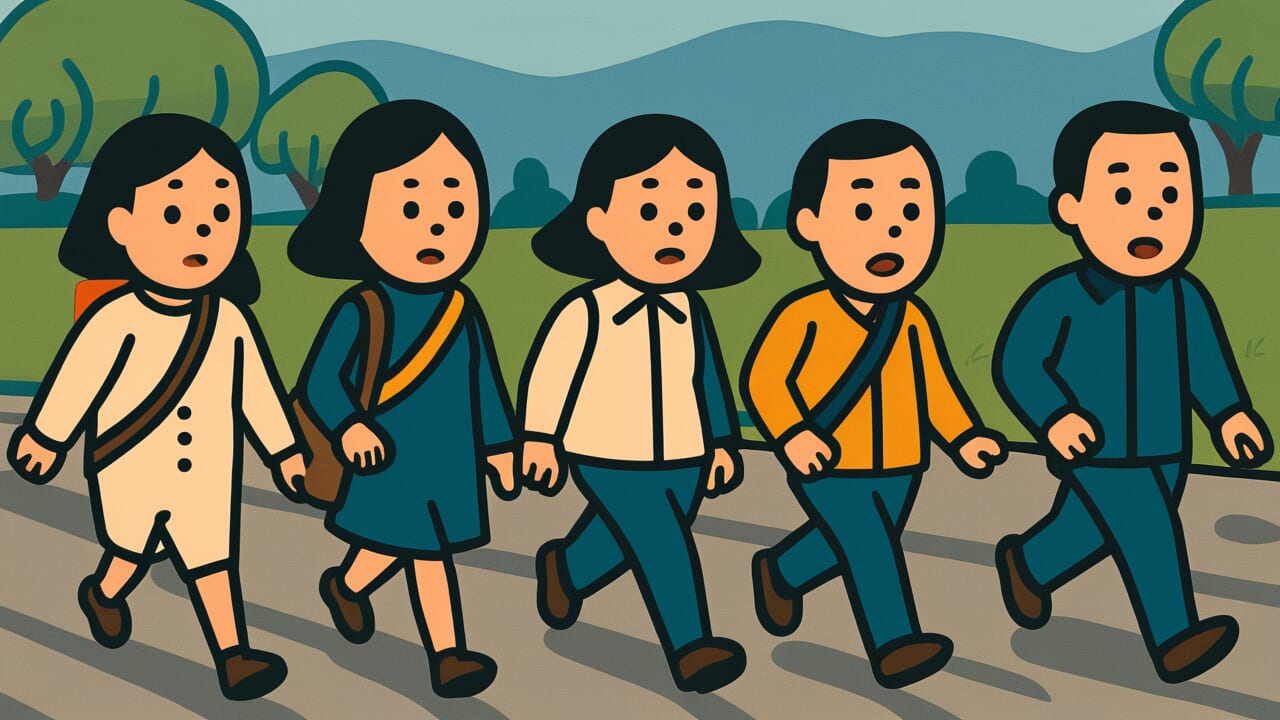How to Read “Hated at seven, hated seven miles away”
Nanatsu nanasato ni nikumareru
Meaning of “Hated at seven, hated seven miles away”
This proverb describes how boys around seven years old are at their most mischievous age. They easily annoy people wherever they go.
At this age, boys grow bigger and stronger. Their curiosity becomes intense.
However, they haven’t fully learned social rules or how to consider others. They often cause trouble without meaning to.
They break things, do dangerous activities, and don’t listen to adults. This makes them a source of worry for parents and neighbors.
People use this proverb when sharing the challenges of raising children. It also helps show understanding for unruly kids.
When someone says “Hated at seven, hated seven miles away,” it creates shared understanding. The difficulty of handling children at this age hasn’t changed since ancient times.
Even today, parents of children this age can use this expression. It helps them share their struggles with each other.
Origin and Etymology
No clear written records explain the origin of this proverb. However, the structure of the phrase reveals interesting background.
“Seven” refers to seven years old. In the old counting system, this meant around six years old by today’s standards.
This age connects deeply with another saying from the Edo period. “Until seven, children belong to the gods” shows how people viewed child-rearing.
Children under seven were treated as sacred beings. After seven, they began to be treated as full human beings. This made seven a turning point age.
“Seven ri” equals about twenty-eight kilometers. This distance far exceeded people’s daily living area back then.
The phrase means their reputation spreads not just to neighbors. It reaches distant villages too. This is an exaggeration to emphasize the point.
Boys at this age gain physical strength and expand their range of movement. Yet their judgment and social skills remain immature.
They’re full of curiosity and can’t sit still. They cause mischief everywhere and trouble adults. This pattern of childhood behavior hasn’t changed over time.
This universal experience of raising children created the proverb. It captures what parents have always felt.
Usage Examples
- My son is “hated at seven, hated seven miles away” – complaints from neighbors never stop
- They say “hated at seven, hated seven miles away,” but maybe this energy only lasts for now
Universal Wisdom
This proverb has been passed down for generations. It reflects deep understanding of the universal challenges of raising children.
The age around seven holds special meaning in human development. Children lose their innocent toddler nature. Their ego emerges and they assert themselves strongly.
However, their social skills and judgment remain undeveloped. They can’t understand how their actions affect others. This unbalanced development causes trouble for those around them.
What’s interesting is that this proverb isn’t just criticism. It contains a kind of resignation and tolerance.
It uses the strong word “hated.” Yet it subtly suggests this is a temporary stage of growth.
Our ancestors understood something important. The difficulty of handling children at this age is a necessary passage in human development.
This proverb also helps ease the loneliness of parenting. Parents learn their child isn’t uniquely difficult.
Every household has experienced this since ancient times. It’s a universal phenomenon. Knowing this brings some relief to parents.
This short phrase contains profound wisdom. It shows human society’s empathy and mutual support in child-rearing.
When AI Hears This
The distance of seven ri shows the most unstable position in human relationship networks. Network theory calls groups of strongly connected people “clusters.”
Seven ri sits right on the boundary line of these clusters.
People in the same village meet daily. They share interests and form strong bonds. This means a high clustering coefficient.
Meanwhile, people ten or twenty ri away have almost no contact. They exist as independent clusters from each other.
But seven ri is different. People can travel this distance a few times per month. So they’re not completely unrelated.
Yet they can’t build daily cooperative relationships. In other words, information travels but trust doesn’t grow. This is the problem with seven ri distance.
Sociologist Granovetter proposed the “strength of weak ties” theory. Moderately distant relationships bring new information.
However, seven ri relationships occupy the worst position. They’re too close to cooperate on information sharing. They’re too far to develop empathy for cooperation.
For example, if a competitor lives seven ri away, you fight over customers. But you can’t help each other in times of trouble.
This mirrors modern social media dynamics. “Acquaintances who aren’t close friends” cause the most trouble.
Research shows that when followers exceed 150 people, these awkward-distance relationships multiply rapidly. The risk of online conflicts increases. This supports the seven ri principle.
Lessons for Today
This proverb teaches modern people an important lesson. Growth always includes difficult periods. We must accept this with tolerance.
In child-rearing, we face challenging times. We often blame ourselves, thinking “Maybe I’m raising them wrong.”
But this proverb tells us “This is natural.” Parents have struggled with the same worries for hundreds of years.
This perspective frees us from unnecessary guilt. We can face our children more calmly.
At the same time, this proverb sends a message to other adults. When we see mischievous children, we shouldn’t immediately blame the parents.
Instead, we can think “Ah, they’re at that stage now.” This gives us room for understanding.
Modern society tends to judge children’s behavior harshly. That’s why the wisdom of this proverb matters even more today.
We should accept difficult behavior as part of the growth process. Don’t demand perfection. Watch over children with a long-term view.
This warmth is exactly what our current era needs most.



Comments